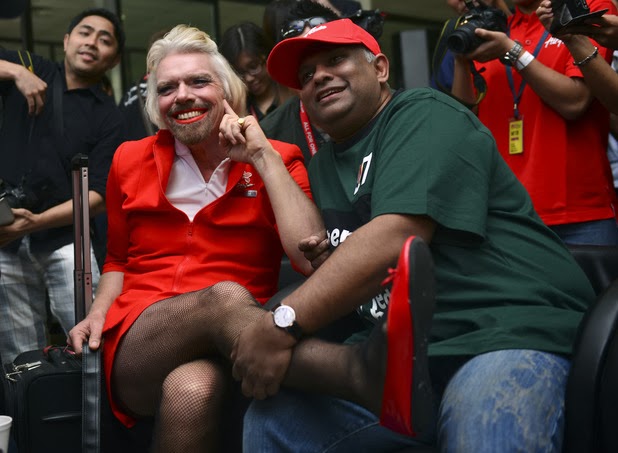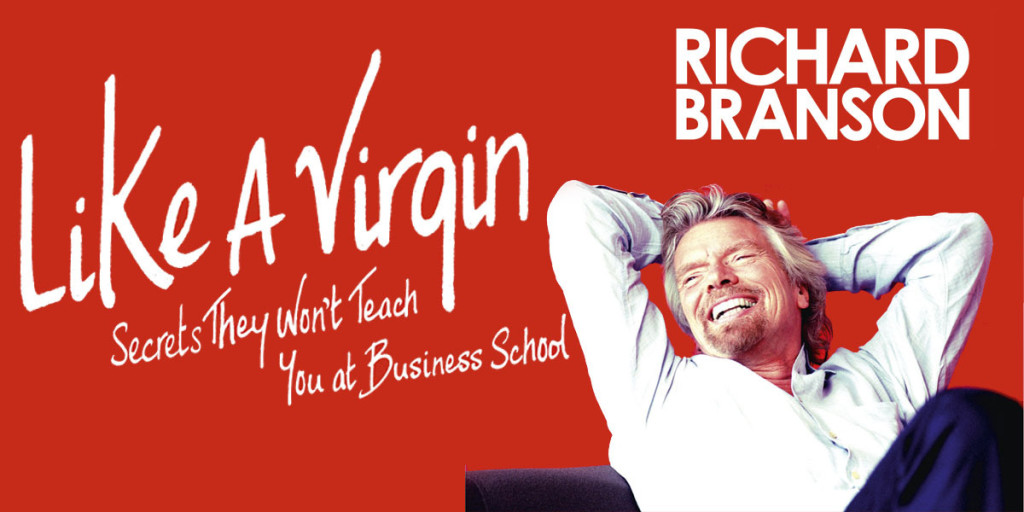Courtesy of Vincent Huberta
Everybody knows Sir Richard Branson, founder of the Virgin Group.
With an estimated net worth of US$4.6 billion, Branson is financially successful beyond anybody’s wildest dreams.
Branson’s Virgin Group of 400 companies hires some 50,000 employees around the world, generating over £15 billion in revenue last year. The highly diversified conglomerate includes businesses in travel, banking, music, mobile services, Internet, film, video games, and most recently space tourism.
Unlike other billionaire bosses, however, Branson is unabashed about pulling outrageous publicity stunts. Moreover, his unconventional yet highly admirable methods of starting, running and investing in businesses weren’t learned from universities. In fact, Branson dropped out of school at the tender age of 16 to start his own magazine business.
What then are the secrets behind his unparalleled success?
Well, the answers to this (and more) can partly be found in Like a Virgin: Secrets They Won’t Teach You at Management School.
Warm and whimsical, Branson’s book is broken up into many bite-sized nuggets of business and managerial wisdom, gleaned through his years of successful serial entrepreneurship.
Let me now highlight some of its key themes.
Entrepreneurship
As a serial entrepreneur, Branson is well known for starting myriad businesses in seemingly unrelated fields. After all, he did venture into opening Virgin Atlantic (an airline) after his initial forays into music.
While risk taking is part and parcel of entrepreneurship, Branson also advised readers to protect their downside. In the case of Virgin Atlantic, for instance, he negotiated with Boeing to lease the fledgling airline’s first plane for 12 months first rather than purchase the aircraft outright. This reduced his financial risk for the business.
Adopting a “David versus Goliath” approach in business, Branson always chooses consumer industries where he can challenge incumbents by providing better customer service, greater value and more fun. Making mistakes and failing is par for the course.
Case in point: Virgin Cola which fought valiantly but lost against beverage juggernauts Coke and Pepsi.
Launching New Businesses
Openly sharing mistakes made when launching businesses which subsequently flopped, Branson provided four useful tips when starting new businesses.
#1 Stay on Target
Start-ups should be focused on their goals and strategies, establish clear timelines, and not get sidetracked by plans for future versions too early in the game.
You should look two to three years ahead at best – not anything beyond. This is due to the uncertainties of how businesses could go over the long-term.
#2 Be Realistic about Costs
This is a cardinal rule for any business to stay afloat and not be swept away by mounting bank loans. Here, Branson advises one to work out one’s budget and then add 75% or even double it to provide adequate financial buffer for business contingencies which always occurs.
#3 Hire the People You Need, Not the People You Like
I love this word of advice and can see how true it is!
Despite being such a friendly guy, Branson is wary about hiring friends and family members to join his businesses. Eschewing personal relationships in favour of professional strengths, he seeks instead to “hire a core team of smart people who already know the industry and its inherent risks.”
#4 Know When to Step Down as CEO
Espousing his view that CEOs should be seen and not heard, Branson leaves the daily operations of business to his managers. While he is always involved in launching new businesses, he chooses to relinquish the reins once the new management team begins to form.
Branding and Publicity Smarts
With a flair for the theatrics, Branson is a media magnet.
Acting on the advice of his mentor Sir Freddie Laker, he milked his personal image to great effect when launching any new businesses.
For example, Branson dressed as a bride when launching Virgin Brides several years ago. More recently, he dolled himself up to be an Air Asia stewardess after losing a bet to his business partner and friend Tony Fernandes.

Only Branson would dress like an air stewardess (courtesy of Digital Spy)
Naturally, the most asked question of Branson was how the name “Virgin” came about. Apparently the result of a humble internal brainstorming session, the Virgin brand was home-brewed by Branson and his team.
Wearing a self-deprecating sense of humour on its sleeve, Virgin is about offering great customer experiences while being irreverent.
Virgin’s Customer Service
With the mantra of underpromising and overdelivering, Virgin firmly believes in providing superior customer service while delighting customers with unexpected kickbacks. This means being open and transparent about costs (as in the case of Virgin Mobile), and empowering staff to take the initiative to arrest customer failures on the spot.
The key here is to ensure that frontliners have all the tools they need to serve customers, such that “the customer always thinks that we are right”.
Solid Corporate Culture
Branson’s infectious sense of fun and adventure permeates Virgin’s many businesses.
To unite his senior managers across different continents and business groups, he regularly organises get-togethers on his famous home cum resort on Necker Island (part of the British Virgin Islands).
Celebrating small and big wins is a big part of Virgin’s culture. This tradition started way back from its humble beginnings as a single record store.
The fact that Branson himself works from home (his “office” is a hammock overlooking the Caribbean) and shuns long-sleeved shirts and ties reveals the fun-loving and irreverent organisational “DNA” which Virgin has.
Caring and Giving to Communities
Passionate about protecting the environment and giving a hand to poor communities around the world, Branson established Virgin Unite as a foundation for Virgin’s philanthropic causes.
With a strong interest in securing alternative energy supplies for the group’s sprawling businesses, Branson regularly invests in clean energy sources like wind and solar power, biofuels and other renewable sources of energy.
Leadership and Management Tips
Despite being the big boss of a large business group, Branson does not impose his will upon his senior managers. Wherever possible, he listens to their ideas and empowers them to make the daily decisions needed to run his businesses smoothly like well-oiled machines.
A keen advocate of management by walking about, Branson enjoys talking to customers to find out more about their experiences with Virgin’s various services.
He also makes it a habit to bring along a small notebook to jot down learning points and follow up areas (a practice that I personally found very useful too).
Developing People
With a deep appreciation for his people, Branson makes it a point to empower staff on the frontlines while equipping them with the right skills and resources. Training is a key aspect of the Virgin way, and this is cascaded down to the different levels and business units.
As you’d imagine, formalities are shunned in Virgin – in fact Branson strongly encourages his managers to get to know their staff outside of the office. Innovative ideas are valued across the organisation, and employees are “caught” for doing something good (rather than bad).
Quoting from the book:
“Relax and have fun, ask questions and listen. Ask your colleague what she sees as her area’s strengths and stumbling points, and listen to her thoughts on the challenges the business faces. Jot down anything that strikes you as worthy of follow up.”
In summary, Like a Virgin is a great read for anybody keen to know how a great entrepreneurial mind ticks. While it is clear that not everybody can be as dashing, charismatic and adventurous in spirit as Richard Branson, the lessons he taught are certainly applicable in most organisations today.

